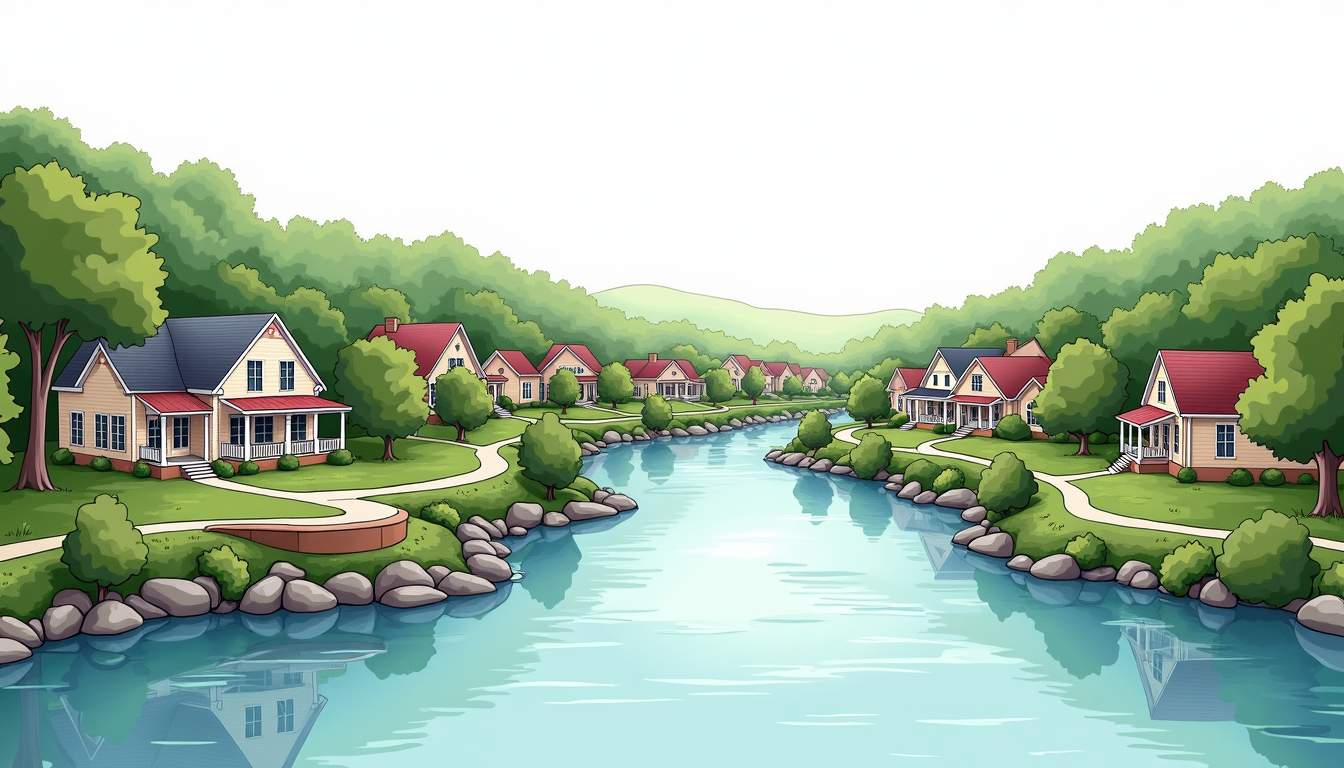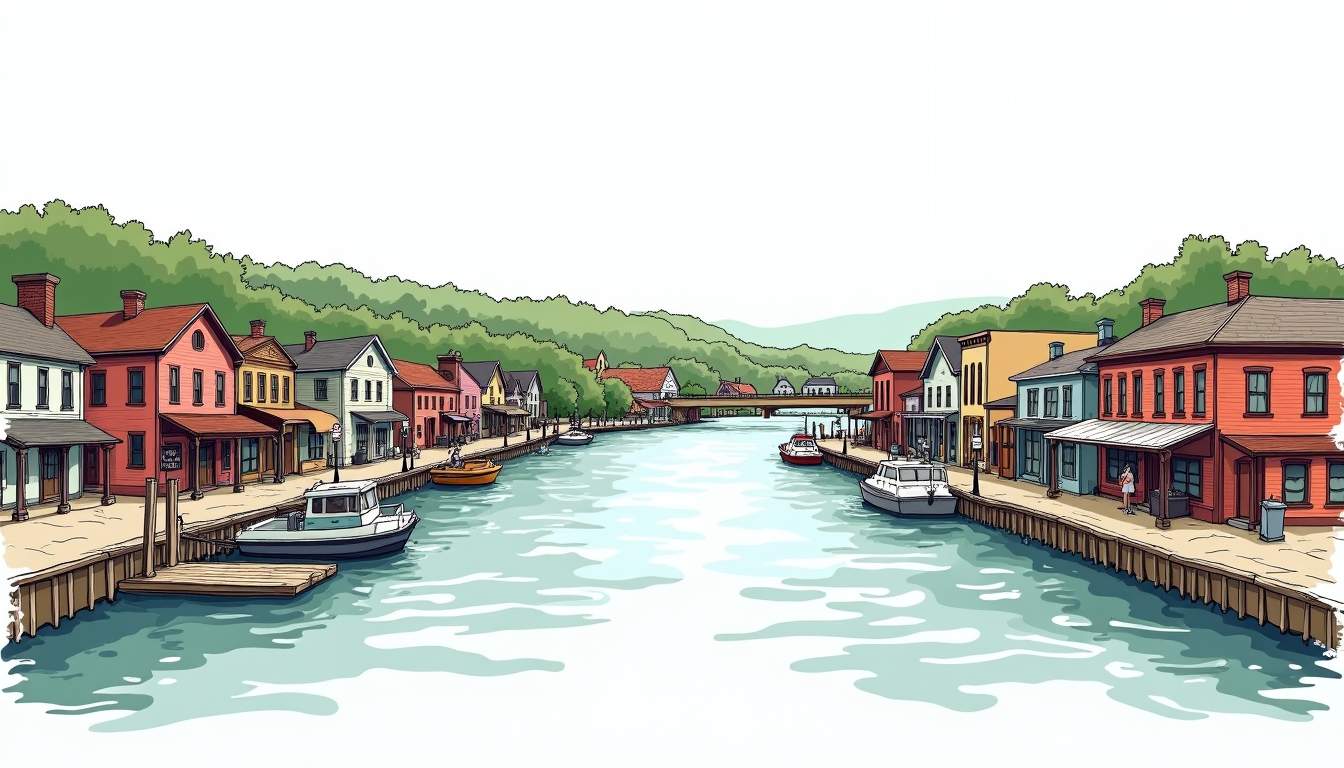
Tennessee offers a surprising variety of neighborhoods centered around water — from calm lakeside communities to riverfront developments and mountain streams that shape the pace of life. These places attract people who value outdoor recreation, scenic views, and a lifestyle oriented around boating, fishing, or simply listening to water. This article explores notable water-focused neighborhoods across the state, what makes them distinct, and practical considerations for anyone thinking about moving to or investing in one.
Water shapes not only landscapes but also daily routines and community culture. In Tennessee, lakes and rivers influence property values, local economies, and recreational options. Neighborhoods near water often prioritize waterfront access, trails, docks, and communal spaces designed to maximize views and activity around the shoreline.

Beyond leisure, water has ecological and infrastructural importance. Wetlands and riparian buffers support biodiversity and reduce flooding risks, while local ordinances and homeowner associations often include rules to protect water quality. The presence of an active angling scene or marina can also create unique social hubs that bring neighbors together through clubs, events, and shared interests.
Moreover, Tennessee’s water bodies serve as critical habitats for fish, birds, and other wildlife, fostering rich ecosystems that add to the natural beauty and environmental health of neighborhoods. Community efforts often focus on conservation and clean-up initiatives to preserve these resources for future generations. These environmental stewardship practices help maintain water clarity and support native species, which in turn sustain the recreational and aesthetic value residents cherish.
The integration of water management technologies, such as rain gardens and permeable pavements, is increasingly common in Tennessee communities. These features not only enhance stormwater absorption but also contribute to reducing the impacts of urban runoff on nearby water bodies. Such sustainable design strategies highlight the growing awareness among developers and homeowners about the importance of harmonizing built environments with natural water cycles to ensure long-term neighborhood resilience.
The Chattanooga region offers neighborhoods with ready access to both the Tennessee River and nearby lakes. Areas along Signal and Chickamauga lakes combine scenic waterfront properties with convenient proximity to the city’s amenities. Residents can enjoy boating, paddleboarding, and lakeside dining without long commutes to urban centers. Many developments feature private docks and community marinas, making it easy for families to plan weekends around the water.
These neighborhoods often blend modern construction with rustic sensibilities, featuring craftsman-style homes and open floor plans oriented toward water views. Parks and greenways along the river provide walking and biking paths, while seasonal events and festivals make the water a focal point of community life.
Central Tennessee’s reservoirs and lakes host several planned communities where the layout and amenities are explicitly designed around water activities. Docks, boat slips, and community pools are common, and many neighborhoods include private launch ramps for residents. This organized approach appeals to families and retirees seeking convenience and camaraderie among neighbors who share a passion for water sports.
These developments often include homeowner associations that maintain common areas and enforce guidelines on dock construction and shoreline use. While that can mean additional fees and regulations, it typically ensures well-maintained public spaces and consistent property standards that protect long-term values.
Neighborhoods along the Mississippi River in Memphis reflect a unique blend of history and contemporary life. River-facing districts combine historic homes and warehouse conversions with riverfront parks, cobblestone promenades, and music venues. The river’s commercial history is visible in the architecture and the presence of working docks, creating neighborhoods with distinct character and energy.

Living on a working river requires balancing industrial activity with residential comfort. Floodplain mapping, levee systems, and emergency plans are part of life here, and residents often become adept at preparing for seasonal changes in the river. At the same time, riverfront festivals and riverboat cruises provide cultural touchstones that keep the waterfront central to community identity.
The Cumberland River runs through Nashville and several neighborhoods along its banks have been shaped by recent redevelopment. Adaptive reuse projects and mixed-use developments have turned former industrial lots into residential, retail, and park spaces. Riverfront greenways, public art, and concert venues create a lively public realm that draws residents and visitors alike.
Neighborhoods that benefit from riverfront renewal offer walkable access to downtown while providing scenic open space. Waterfront planning in metropolitan areas typically aims to balance increased density with public access, so new developments often include boardwalks, river access points, and long-term commitments to preserving riparian corridors for recreation and habitat.
In East Tennessee, smaller waterways running through mountain foothills create neighborhoods that feel remote yet connected. Communities clustered around creeks and small lakes offer a calmer alternative to large-lake living — fishing and kayaking on a local stream can be a daily ritual rather than a weekend event. The natural surroundings encourage stewardship and a close relationship with the land.

Homes in these areas often feature rustic finishes and designs intended to bring the outdoors in: large porches, floor-to-ceiling windows, and trails weaving through wooded lots. For homeowners seeking solitude and natural beauty, these neighborhoods provide quiet water sounds and abundant wildlife without the traffic and bustle of bigger lake resorts.
Some mountain neighborhoods take a resort approach, combining private lakes or ponds with shared amenities like lodges, fitness facilities, and trail networks. These developments cater to buyers who want the convenience of on-site services plus access to nearby state parks and scenic drives. The result is a tight-knit community where social life often revolves around seasonal activities organized by neighborhood associations.
Because access and maintenance can be complex in remote areas, potential buyers should research road maintenance responsibilities, septic systems, and water rights. Knowing how water is sourced and managed — whether through wells, community systems, or municipal hookups — is essential to ensuring a comfortable lifestyle in these settings.
Waterfront and riverfront properties come with specific regulatory and insurance concerns. Floodplain maps and elevation certificates should be reviewed carefully. Flood insurance may be required and can significantly affect ongoing costs. Local zoning and environmental protections may also restrict building near shorelines or require specific erosion-control measures.
Proactive planning and realistic budgeting for these expenses can prevent surprises. Working with a local agent who understands FEMA maps, levee classifications, and seasonal water behavior helps buyers assess long-term risk. In many communities, investments in shoreline stabilization or riparian buffer restoration are common and sometimes coordinated by neighborhood associations.
Access to water — private dock rights, shared marinas, or public ramps — varies widely. Confirm the legal status of docks and slips, and understand any fees or reservation systems that govern their use. When properties share infrastructure like private roads or community boat ramps, maintenance responsibilities often fall to the homeowners’ association, which can influence monthly dues and special assessments.
Community covenants may also define acceptable boat types, dock construction materials, and shoreline plantings. Those rules preserve aesthetic and environmental quality but can limit certain uses. Prospective buyers should read hoa documents and neighborhood guidelines before making commitments.
Water-centered neighborhoods foster particular social rhythms: morning paddles, weekend fishing tournaments, lakeside barbecues, and community dock parties. Local clubs and associations often organize events that reinforce neighborly ties, from volunteer cleanups to sailing lessons for kids. The seasonal nature of water recreation in Tennessee — warm summers and milder winters — creates a cyclical calendar of activities that keeps communities engaged.
Nearby businesses often cater to these lifestyles. Marinas, outfitters, bait shops, and waterfront restaurants become local hubs. In smaller towns, the water-focused neighborhood can be a prime driver of year-round tourism, supporting a vibrant local economy and diverse small-business scene.
Waterfront properties generally maintain strong buyer interest, but liquidity and resale value depend on location, accessibility, and maintenance. A well-managed community with protected views and durable shoreline infrastructure tends to hold value better than areas with inconsistent governance or environmental degradation. Proximity to urban centers and local amenities also plays a major role in resale prospects.
Investors should weigh the trade-offs between premium prices for waterfront access and the added costs of insurance, maintenance, and possible restrictions. For many buyers, the intangible benefits — lifestyle, views, and community — justify the extra expense. An informed approach, including inspections focused on water-related wear and property susceptibility to flooding or erosion, helps protect that investment.
Research local water conditions, seasonal behaviors, and historical flood data. Schedule inspections that pay attention to shoreline stability, dock condition, and water-related infrastructure. Speak with neighbors about living patterns and community rules, and consult HOA documents for hidden costs or restrictions. Finally, test the lifestyle: rent a nearby property for a weekend if possible, to see how closely the neighborhood aligns with recreational and social expectations.
Choosing a water-focused neighborhood in Tennessee often means opting for a life shaped by seasons, outdoor activity, and community connections. When planning carefully and accounting for the unique demands of waterfront living, the water becomes not just a backdrop but a daily source of enjoyment and identity.
Ready to embrace the water-focused lifestyle Tennessee has to offer? Tennessee National combines luxury living with exclusive waterfront access, including a private marina and waterfront dining, all within a premier gated community. From move-in ready homes to custom builds, enjoy resort-style amenities like a Greg Norman Signature Golf Course, scenic nature trails, and vibrant social clubs. Schedule a Private Tour today and start making memories by the water every day.